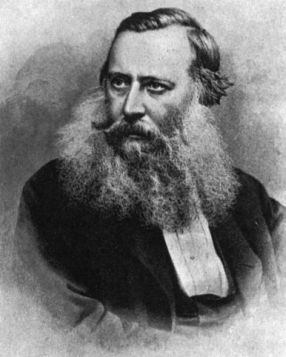
An attempt to classify the `varieties’ of animals, with observations on the marked seasonal and other changes which naturally take place in various British species, and which do not constitute varieties (1835)
When two animals are matched together, each remarkable for a certain given peculiarity, no matter how trivial, there is also a decided tendency in nature for that peculiarity to increase; and if the product of these animals be set apart, and only those in which the same peculiarity is most apparent, be selected to breed from, the next generation will possess it in still more remarkable degree; and so on, till at length the variety I designate a breed, is formed, which may be very unlike the original type.
……..It is worthy of remark, however, that the original and typical form of an animal is in great measure kept up by the same identical means by which a true breed is produced. The original form of a species is unquestionably better adapted to its natural habits than any modification of that form; and, as the sexual passions excite to rivalry and conflict, and the stronger must always prevail over the weaker, the latter, in a state of nature, is allowed but few opportunities of continuing its race. In a large herd of cattle, the strongest bull drives from him all the younger and weaker individuals of his own sex, and remains sole master of the herd; so that all the young that are produced must have had their origin from one which possessed the maximum of power and physical strength; and which, consequently, in the struggle for existence, was the best able to maintain his ground, and defend himself from every enemy.
In like manner, among animals which procure their food by means of their agility, strength or delicacy of sense, the one best organized must always obtain the greatest quantity; and must, therefore, become physically the strongest, and be thus enabled, by routing its opponents, to transmit its superior qualities to a greater number of offspring.
Observations on the various seasonal and other external changes which regularly take place in Birds, more particularly in those which occur in Britain; with remarks on the great importance in indicating the true affinities of species; and upon the natural system of arrangement (1836)
The true physiological system is evidently one of irregular and indefinite radiation, and of reiterate divergence and ramification from a varying number of successively subordinate typical plans; often modified in the extremes, till the general aspect has become entirely changed, but still retaining, to the very ultimate limits, certain fixed and constant distinctive characters, by which the true affinities of species may always be known; the modifications of each successive type being always in direct relation to particular localities, or to peculiar modes of procuring sustenance…..
On the psychological distinctions between man and all other animals; and the consequent diversity of human influence over the inferior ranks of creation, from any mutual and reciprocal influence exercised among the latter (1837)
…….But here a question arise, that, as numerous instincts in domestic animals, which are now hereditary, are known to have been originally habits superinduced by man’s agency, to what extent may not all the innate propensities and consequent habits of animals have originated in the acquired experience of their predecessors?
……..
A variety of important considerations here crowd upon the mind; foremost of which is the inquiry, that, as man, by removing species from their appropriate haunts, superinduces changes on their physical constitution and adaptations, to what extent may not the same take place in wild nature, so that, in a few generations, distinctive characters may be acquired, such as are recognized as indicative of specific diversity?…….. May not, then, a large proportion of what are considered species have descended from a common parentage?
Back to “Six of the Best” or “Darwin’s Influences”.
